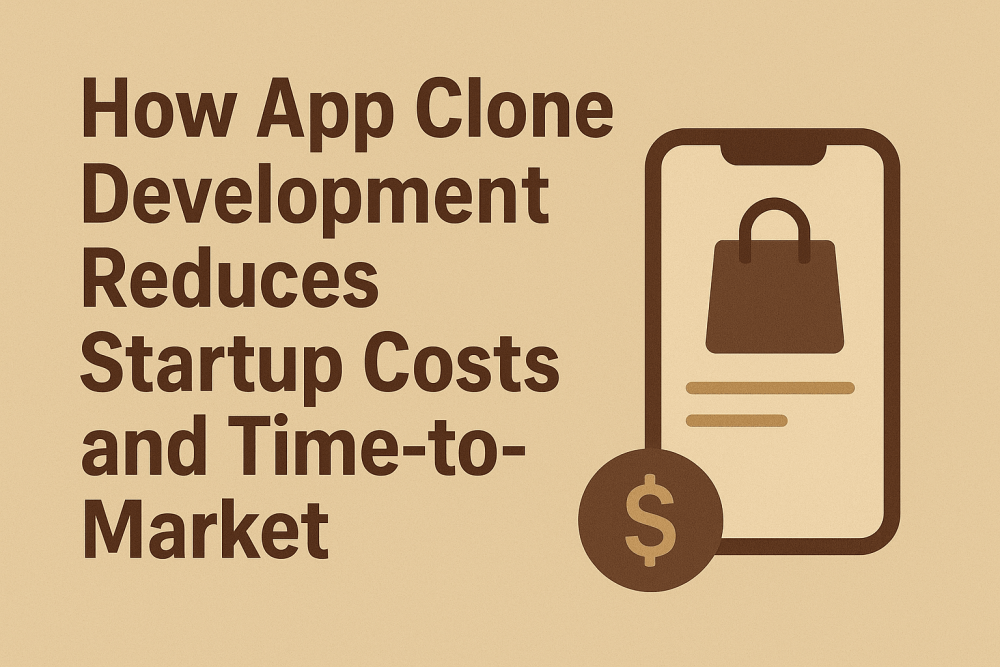Starting a business is exciting, but let’s be real it’s also stressful and expensive. Every founder dreams of building the “next big app,” but once you peek at the development bill and timeline, reality hits hard. Hiring developers, coding from scratch and testing endlessly can feel like burning money while watching the clock tick.
This is precisely why the development of app clones has revolutionized the industry. Instead of beginning anew, you adapt a framework from an existing app to suit your requirements. Think of it as using a recipe: the base is familiar, but you can spice it up however you like.
What is App Clone Development?
The creation of an app clone entails designing an application that is based on a successful pre-existing app. No, it’s not about replicating another person’s app exactly. Instead, you replicate the core structure, the components that operate such as secure transactions and user access, while adding your unique branding and features.
So, in short you’re not reinventing the wheel, you’re just painting it a new color and adding better rims
Cutting Costs Where It Hurts Most
Here’s some truth: custom app development can chew up budgets faster than you expect. Recruiting full-stack developers, designers, and QA teams from the ground up is expensive. Cloning, conversely, utilizes pre-constructed modules. Instead of paying for 500 hours of coding a payment gateway, you can drop in one that’s already built and battle-tested.
Less development time = fewer bills. And when you’re running a startup where every dollar feels like gold, that’s a serious win
Speeding Up Time-to-Market
Timing can make or break a startup. If you wait too long, someone else might swoop in with the same idea. App clones give you a head start because the foundation is already done. You just need to tweak and launch.
We’re talking weeks instead of months (or years). That means you can roll out your MVP, test real user reactions, and pivot quickly if needed. Basically, you’re spending less time in “development limbo” and more time in the actual market.
Reliability
A commonly underestimated benefit of app cloning is the reliability. By utilizing frameworks influenced by well-known applications, you adopt functionalities that have been validated in practical scenarios. Nobody wants their launch day ruined by constant crashes.
It’s like buying a house that already passed a safety inspection you can remodel later, but at least you know the foundation won’t collapse on you.
Customization Matters
Some people hear “clone” and immediately think “knock-off.” But good clone development isn’t about making carbon copies. It requires employing a strong base while adding your distinctive touch.
For instance, two food delivery applications may share identical ordering and payment features, yet one can differentiate itself by focusing on exclusively organic restaurants or providing subscription savings. The structure might appear alike, but the skin and character are entirely yours.
Lower Risk, More Flexibility
Let’s be honest, startups live on a knife’s edge. What if your app idea doesn’t click? What if the market shifts mid-development? Cloning reduces that risk because you’re not throwing millions into untested waters.
You can launch a Minimum Viable Product (MVP) faster, gather real feedback, and then decide whether to double down or pivot. It’s like dipping your toes in the pool instead of cannonballing blindfolded.
Industry Examples You’ve Already Seen
Don’t think clone development is just a small startup trick. It’s everywhere. Ride-hailing applications frequently originate as replicas of Uber. E-commerce startups design their models based on Amazon or Shopify. Food delivery platforms resemble Zomato or DoorDash.
The magic isn’t in the base model but it’s in how you make it resonate with your target audience. Individuals appreciate familiar interfaces, so employing established layouts indeed boosts adoption rates.
Compliance and Security
One important note to remember is conserving time and resources doesn’t imply neglecting the tedious yet essential tasks. Applications must continue to adhere to data privacy laws & payment security guidelines. The upside is most clone frameworks already have compliance basics baked in.
That said, you’ll still need to fine-tune things for your industry and region. Better safe than sorry when it comes to security.
Balancing Speed with Innovation
Here’s the golden rule: cloning is your shortcut, not your ceiling. If you create a copy and fail to innovate, you’ll merely conform. The best startups use clone development to save time on the essentials, then invest energy into user experience, niche features and building a strong brand.
Think of it this way, if cloning gives you the canvas, but the masterpiece still has to come from your creativity.
Conclusion
App clone development isn’t about cutting corners but about cutting waste. It lowers costs, speeds up launches and gives startups a reliable foundation to build on. But the real magic happens when founders take that framework and add something fresh.
In an environment where quickness and flexibility frequently determine success, clone development allows startups to minimize time spent on fundamentals and focus more on creating their unique offerings. And honestly, for most founders, that’s the smartest play.
